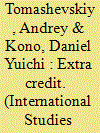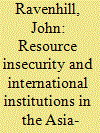| Srl | Item |
| 1 |
ID:
139530


|
|
|
|
|
| Summary/Abstract |
Credit rating agencies such as Moody's and Standard & Poor's have considerable influence in the global economy. Nonetheless, we know little about the factors that affect these ratings, particularly factors under government control. We argue that participation in preferential trade arrangements (PTAs) can significantly improve national credit ratings by “locking in” liberal trade policies at home and abroad. This both ensures a stable stream of export revenues and represents a commitment to market-friendly policies of which the rating agencies approve. We test and find support for this hypothesis with an analysis of intra-PTA trade and credit ratings in 100 countries from 1971 to 2008. As expected, intra-PTA trade consistently improves national credit ratings. However, this effect is only partially mediated by trade volatility and other economic variables, suggesting that the rating agencies' support for PTAs is partly ideological in nature. Interestingly, overall trade openness does not affect credit ratings once we control for participation in PTAs. It is thus the formal commitment to open trade, rather than the volume of trade per se, that improves credit ratings. Our results point to the growing importance of private actors in international governance, as well as to the interrelated nature of trade and financial regimes.
|
|
|
|
|
|
|
|
|
|
|
|
|
|
|
|
| 2 |
ID:
120204


|
|
|
|
|
| Publication |
2013.
|
| Summary/Abstract |
East Asian governments have long recognized that national security must incorporate a reduction of their vulnerability to the disruption of essential imports. The rapid economic growth of China and India has intensified competition for increasingly scarce resources, elevating resource security once again to the top of the international agenda. Issues that were previously regarded as 'technical' have been 'securitized' as state elites perceived possible conflicts over availability and pricing of natural resources as threats to national security.
International institutions have the potential to contribute to the defusing of tensions over the supply of commodities by providing, through various means, assurances regarding the behaviour of partners. Only the global institutions concerned with commodities trade, the International Energy Agency (IEA) and the World Trade Organization (WTO), have legally binding arrangements and the authority to impose sanctions on states that fail to comply with their obligations. But both have weaknesses: the IEA's membership is limited; the WTO's rules relating to raw materials trade are far from comprehensive. Most of the regional institutions in this field seldom go beyond information exchange or the setting of aspirational targets. At the bilateral level, government attempts to enhance resource security through minerals chapters in preferential trade agreements have had little success. Bilateral investment treaties are the only instances of cooperation at the sub-global level that incorporate legally-binding provisions.
The cooperation on resources issues in which countries have engaged has reflected the core characteristics of Asia-Pacific bilateral and regional intergovernmental institutions. The shallowness of cooperation reflects perceptions on the part of state elites that their interests in the resources sector are best served by national rather than collective action and that current cooperative arrangements fail to provide sufficient incentives to prevent states from succumbing to opportunistic behaviour in the event of a short-term clash of interests. The potential gains to be made from a cooperative approach to resource security remain largely unrealized.
|
|
|
|
|
|
|
|
|
|
|
|
|
|
|
|